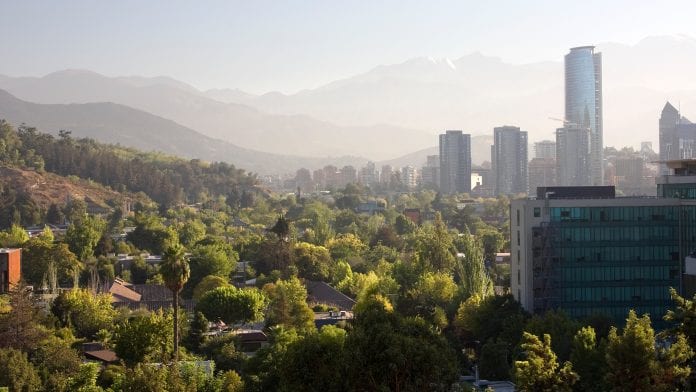
Writer and entrepreneur Simon Espinosa tells MCN about cannabis culture and the future of the industry in Latin America.
Trilingual writer and entrepreneur Simon Espinosa is the founder and CEO of En Volá Cannabis HUB, a Chile-based media and product development company which aims to promote informed consumption and connect producers with consumers at each stage of the cannabis value chain. He speaks with MCN about cannabis culture and the future of the industry in Latin America.
You are commonly referred to as Chile’s first cannabis sommelier. What does that entail, and what did you have to do to gain the title?
This is a funny misunderstanding: I gained the title from the headline of a newspaper interview in which I talked about the Interpening course at the Trichome Institute in Denver, Colorado, which among many other things presents a practical assessment to help students understand the potential effects that a given cannabis flower could have on the body. In this assessment, besides understanding the flower structure, trichome quality and other fundamentals, there was an interpretation of the terpenes and their smells. However, I am not a sommelier – and if I were, I would not be the first in Chile; as the cannabis culture in this country is very old. There are several Cannabis Cups here every year, summoning wonderful sommeliers to try the excellent flowers that this land produces.
With that being said, I have used the information provided in this course, alongside my own more than 15 years growing and studying cannabis, to build useful digital content that could help cannabis users to make more informed decisions when using cannabis in a country which has not yet legalised it.
What is the legal status of cannabis in Chile? Should the law be more lenient?
We have a very non-specific drug law, which entitles people to use drugs of any kind as long as those drugs are meant for personal and exclusive consumption in the short term. However, it is up to the police officers, prosecutors and judges to decide if the quantities you held were meant for this purpose or not. This leaves cannabis users in a very unprotected position, legally.
But cannabis use has a long record in the country; and after a period of prohibition, in the last five years we have seen tolerance grow – people now use cannabis openly; police operations persecuting growers and medical users has decreased considerably; and cannabis dispensaries have appeared in their hundreds, providing medical users a delivery system for their needs. While this is technically illegal, it is still tolerated.
How do you see cannabis legislation evolving in Latin America in the next few years?
Legislation is evolving as we speak. Chile was the first pioneer, with the largest legal cannabis growth by Fundación Daya in 2016. Since then, we have fallen behind. Uruguay, Peru, Colombia, Argentina, Brazil and Mexico have all either legalised medical use of cannabis or have bills to do so currently being debated.
Uruguay was the first country in the world to legalise adult use cannabis and Colombia is currently exporting products and seeds – although not without regulatory obstacles, which I believe we will see in every local legislation for some time; as the process needs to settle properly, echoing each country’s culture. We must not forget that, for countries like Mexico and Colombia, the relation with drugs is an extremely sensitive subject, attached to deep social problems and collective sadness.
Independently, it is expected that the priorities of most countries in Latin America will shift towards tax revenue eventually: the cannabis consumer base is wide. Chile, for example, is one of the world’s top five cannabis consumers; and the cannabis industry in Latin America as a whole is expected to reach a value of US$28.07bn by 2024.
Are there any developments or issues in the Latin American cannabis industry that our readers may not be aware of?
Yes! And this is a very exciting perspective to share. While the financial sector of the industry primarily targets Latin America as a strategic asset to grow cheap cannabis in order to supply products for first world users, I see an ecosystem of companies, universities, institutions and startups, all driven by research and innovation; and doing so much more than just growing cannabis.
The cannabis user base in this region is so wide and solid, and cannabis itself is so ingrained in our culture, that consumer behaviour has evolved. Consumers are now demanding everything else they demand from a commodity market – from a wide catalogue of repository products from companies that invoice millions of dollars annually, to digital assets as apps and content to improve homegrown quality and overall experience.
Many cannabis-adjacent Latin American startups which do not touch the plant have made their way in the US and Europe, like ourselves; and, with innovative business models, have capitalised where others failed. We have seen a very pronounced drop in the investment curve of big companies that purchased Latin American entrepreneurships, whose only value was to hold a licence to produce cannabis in a country with no implemented capacity to process an exportation order.
My advice is to take a closer look to what happens to the startup ecosystem when there is political adversity but huge demand and a non-integrated supply chain: the profitability for first movers is immense.
Simon Espinosa
CEO
En Volá Cannabis HUB
https://www.envola.cl
This article is for issue 3 of Medical Cannabis Network. Click here to get your free subscription today.


















